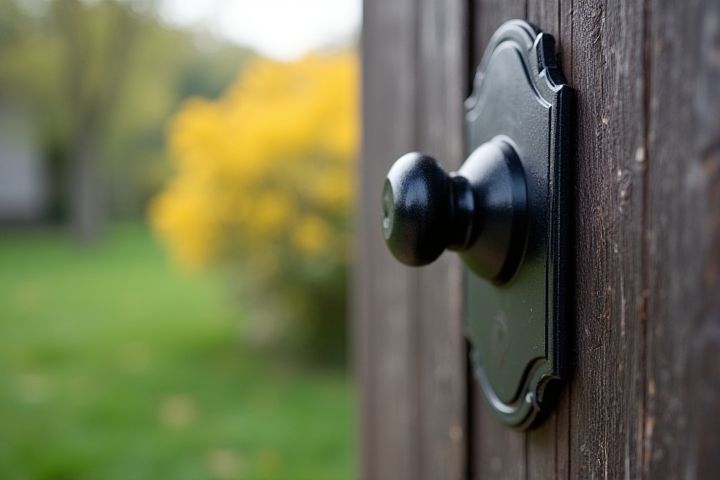
To enhance your home's privacy, consider installing tall fences or privacy screens strategically around your property. Planting dense shrubbery or evergreen trees can serve as a natural barrier, blocking the view from neighbors and passersby. Utilizing outdoor decor, such as trellises or outdoor curtains on patios and balconies, can create secluded spaces for relaxation. Incorporating soundproof windows and heavy drapes will not only provide visual privacy but also reduce noise from outside. Consider positioning outdoor lighting to illuminate your private areas while maintaining a cozy atmosphere.
How To Increase House Privacy
Install quality blinds or curtains
Installing quality blinds or curtains is essential for enhancing your home's privacy. Opt for materials that block the view from outside, such as blackout curtains or wooden blinds, which can effectively create a barrier without sacrificing style. Consider choosing layered window treatments that offer adjustable light control and additional noise reduction, enhancing your overall living environment. By investing in durable and aesthetically pleasing options, you can ensure that your home remains a private sanctuary from prying eyes and outside distractions.
Add frosted or decorative window films
Frosted or decorative window films can enhance your home's privacy while allowing natural light to penetrate. These films can block the view from outside, making it difficult for onlookers to see into your space, especially during the day. Available in various designs, from simple frosted patterns to intricate motifs, these films can complement your home decor. Installation is straightforward; you can apply them yourself or hire professionals, with prices typically ranging from $10 to $50 per square foot.
Build a privacy fence or wall
Building a privacy fence or wall can significantly enhance your home's privacy by creating a visual barrier between your property and surrounding areas. Opt for materials such as wood, vinyl, or composite, with heights typically ranging between 6 to 8 feet, depending on local regulations. Incorporate design elements like lattice tops or decorative panels to not only improve aesthetics but also obstruct line-of-sight. Selecting plants such as evergreens or climbing vines can further bolster privacy, complementing your fence or wall while providing additional noise reduction.
Use outdoor privacy screens or hedges
Outdoor privacy screens, made from materials like wood, metal, or fabric, can effectively block the view from neighboring properties, creating a secluded atmosphere in your yard. Consider using tall hedges, such as Leyland cypress or Arborvitae, which not only enhance privacy but also serve as an attractive green boundary. You can strategically place these screens or plant hedges around patios, decks, or swimming pools to define your personal space. Incorporating elements like trellises with climbing vines alongside hedges can further enhance both privacy and aesthetics, allowing you to enjoy your outdoor areas without prying eyes.
Install security cameras
Installing security cameras significantly enhances your home privacy by monitoring the exterior and interior of your property. Opt for high-definition cameras with features like night vision and motion detection, typically ranging from $100 to $300 per unit. Position cameras at key entry points, such as doors and windows, to cover blind spots and deter potential intruders. Ensure you choose a reputable brand with an app for remote access, allowing you to monitor your home in real-time, which can reduce anxiety about privacy and security.
Use smart window films
Smart window films are an innovative solution to enhance your home's privacy while allowing you to control natural light. These films can switch from transparent to opaque with a simple click, offering immediate seclusion when needed, whether for daytime or nighttime use. By applying smart window films to your windows, you can effectively block outside views without sacrificing aesthetics or daylighting, as they still allow ambient light to filter through. Investing in this technology not only boosts privacy but also reduces glare and improves energy efficiency in your home.
Apply window tinting
Applying window tinting can significantly enhance your home's privacy, especially with films that provide varying levels of visibility. High-performance window films can block up to 99% of harmful UV rays while allowing natural light to enter, maintaining an inviting atmosphere without compromising seclusion. Consider choosing a reflective or dark-tinted film that obscures the view from outside while preserving your indoor visibility. Opting for a professional installation can ensure a flawless application and maximize the benefits of your chosen tint, protecting your belongings and your peace of mind.
Design strategic landscaping
Incorporating strategic landscaping into your home's design is essential for enhancing privacy. Consider planting dense evergreen trees or shrubs to create natural barriers that obscure views from neighbors and passersby. Installing trellises adorned with climbing plants can further enhance visual seclusion while adding aesthetic appeal. Additionally, utilizing outdoor hardscapes like privacy screens or decorative fences can define your property boundaries, ensuring your outdoor space remains a serene retreat.
Incorporate interior room dividers
Incorporating interior room dividers is an effective way to enhance privacy in your home, creating distinct zones for relaxation, work, or entertaining. Consider using decorative screens, open shelving units, or even dense plants as stylish dividers that not only separate spaces but also add aesthetic value. You can opt for materials such as wood or fabric to absorb sound, further improving the atmosphere of tranquility in your home. By strategically placing these dividers, you can tailor your living environment to suit your needs, ensuring both comfort and seclusion.
Use noise-reducing window treatments
Noise-reducing window treatments can significantly enhance your home's privacy and comfort. These specialized window coverings, such as blackout curtains or soundproof shades, absorb sound vibrations, creating a quieter indoor environment. By utilizing products with a noise-reduction rating (NRR) of at least 20 decibels, you can minimize external disturbances from traffic or neighbors. Consider investing in heavy fabric options that not only block sound but also provide added insulation, making your home more energy-efficient.
